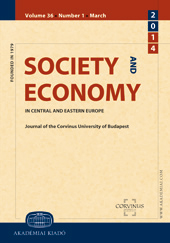Functional Income Distribution in Portugal: The Role of Financialisation and Other Related Determinants
Functional Income Distribution in Portugal: The Role of Financialisation and Other Related Determinants
Author(s): Ricardo Barradas, Sérgio LagoaSubject(s): National Economy, Governance, Economic history, Labor relations, Public Finances
Published by: Akadémiai Kiadó
Keywords: financialisation; inequality; Portuguese functional income distribution; cointegration; ARDL models;
Summary/Abstract: This paper provides an empirical analysis of the relationship between the labour income share and financialisation, as well as other related variables in Portugal from 1978 to 2012. We estimate an equation for the labour share that includes standard variables (technological progress, globalisation, education and business cycle) and variables to capture the effect of financialisation. We formulate the hypothesis that the financialisation process may lead to a rise in the inequality of functional income distribution through three channels: the change in the sectoral composition of the economy (due to both the increase in the weight of financial activity and the decrease in government activity), the diffusion of shareholder value governance practices and the weakening of trade unions. Our results show that the financialisation process has an indirect long-term effect on the labour share through its impact on government activity and trade union density. The paper also finds evidence supporting the traditional explanations for functional income distribution, namely globalisation, education and business cycle.
Journal: Society and Economy. In Central and Eastern Europe ǀ Journal of the Corvinus University of Budapest
- Issue Year: 39/2017
- Issue No: 2
- Page Range: 183-212
- Page Count: 30
- Language: English

